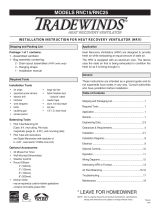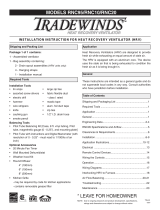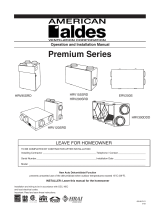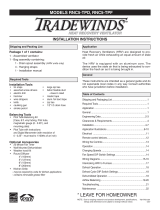Page is loading ...

Installation Tools
• tin snips • large zip ties
• assorted screw drivers • fabric flexible duct
• electric drill - class II rated
• hammer • mastic tape
• wire strippers • alum. foil duct tape
• knife • zip ties
• caulking gun • 1/2” I.D. drain hose
• smoke pencil
Balancing Tools
• Pitot Tube Balancing Kit
[Case, 8 ft. vinyl tubing, Pitot tube,
magnehelic gauge (0 - 0.25”), and
mounting plate]
•
Pitot Tube with instructions
and Digital Manometer (with resolution of
0 - 0.25” - must read to 1/100ths of an inch)
Heat Recovery Ventilators (HRV) are designed to provide
fresh air while exhausting an equal amount of stale air.
The HRV is equipped with an aluminum core. The device
uses the stale air that is being exhausted to condition the
fresh air as it is being brought in.
These instructions are intended as a general guide and do
not supersede local codes in any way. Consult authorities
who have jurisdiction before installation.
Required Tools................................................................1
Application.......................................................................1
General ...........................................................................1
Table of Contents............................................................1
Engineering Data ............................................................2
Motorized Damper Assembly..........................................3
Clearances & Requirements ...........................................4
Installation....................................................................4-6
Electrical .........................................................................7
Dehumidistat Operation ..................................................8
Air Flow Balancing .....................................................9-10
Maintenance .................................................................11
INSTALLATION INSTRUCTION FOR FRESH AIR EXCHANGER
Application
General
Table of Contents
Required Tools
* LEAVE FOR HOMEOWNER
NOTE: Due to ongoing research and product development, specifications,
ratings and dimensions are subject to change without notice.
TI-FAE-001
1207
MODELS 94-EXCHANGER, 94-EXCHANGER-MD, 99-MD-KIT
See page 3 for 99-MD-KIT installation instructions
ATTENTION

2
MODEL 94-EXCHANGER-MD - Includes 24 volt motorized damper
21.25"
(540 mm)
STALE AIR
TO OUTSIDE
FRESH AIR
FROM OUTSIDE
STALE AIR
FROM INSIDE
FRESH AIR
TO INSIDE
15"
(380 mm)
18.75"
(475 mm)
*All Duct Connections 6" (150mm)
FILTER
BALANCING
COLLARS
FILTER
ALUMINUM HEAT
EXCHANGE CORE
*NOTE: Front clearance
of 25 inches (635 mm)
is recommended
for servicing unit.
DRAIN
SPOUT -1/2" O.D.
(DRAIN TUBING - 1/2" I.D.)
TA P E
TO DRAIN
TEE
CONNECTOR
DRAIN
SPOUT - 1/2" O.D.
21.25"
(540 mm)
STALE AIR
TO OUTSIDE
FRESH AIR
FROM OUTSIDE
STALE AIR
FROM INSIDE
FRESH AIR
TO INSIDE
15"
(380 mm)
18.75"
(475 mm)
*All Duct Connections 6" (150mm)
FILTER
BALANCING
COLLARS
FILTER
ALUMINUM HEAT
EXCHANGE CORE
*NOTE: Front clearance
of 25 inches (635 mm)
is recommended
for servicing unit.
DRAIN
SPOUT -1/2" O.D.
(DRAIN TUBING - 1/2" I.D.)
TA P E
TO DRAIN
TEE
CONNECTOR
DRAIN
SPOUT - 1/2" O.D.
24 VOLT MOTORIZED DAMPER
1204
Engineering Data - HRV
Dimensions HRV
inches (mm)
Dimensions HRV
inches (mm)
WARRANTY:
Lifetime warranty on Aluminum Heat Exchange Core.
Five year warranty on all other parts.
MODEL 94-EXCHANGER - No damper. Optional kit (99-MD-KIT) can be added
Typical airflow is between 0 cfm and 130 cfm.
Typical airflow is between 60 cfm and 130 cfm.
Date: ___________________________________________
Tag: _____________________Qty:___________________
Project: _________________________________________
Engineer: _______________________________________
Contractor: ______________________________________
Supplier: ________________________________________
Quote#: _________________________________________
Submitted by: ____________________________________

3
Motorized Damper Assembly
Mount the damper motor by aligning the four (4) holes in
the mounting plate to the four holes on the unit’s top plate.
This will automatically align the damper motor coupling
with the damper shaft.
Align the damper in the fully closed position. Using a 1/8”
Allen key to tighten the set screw.
Dampers should now be in the fully closed position with no
power. Identify desired wiring diagram in this guide.
Activating the damper motor should open flaps to 90˚.
Damper rod
Set
screw
Damper
door
Damper
door
Set
screw
Damper collar
Damper collar
1/8" Allen Key

4
Location Selection
The HRV must be located in a heated space where it will
be possible to conveniently service the unit. Typically the
HRV would be located in the mechanical room or an area
close to the outside wall where the weather hoods will be
mounted. If a basement area is not convenient or does not
exist, a utility or laundry room may be used.
Attic installations are not normally recommended due to:
A) the complexity of work to install
B) freezing conditions in the attic
C) difficulty of access for service and cleaning
The HRV unit must be installed in a horizontal position as
shown in the illustration below. The unit should be sus-
pended using the provided hanging straps. If necessary,
the unit may be installed on a platform: however, the cabi-
net should be isolated from the platform to prevent
vibration transmission. The unit must be level. Sufficient
clearance at the front of the access door is required for
servicing the air filters and core. A minimum of 25"
(635mm) clearance is recommended so the door can be
opened. Four PVC reinforced polyester hanging straps are
provided for hanging the HRV from the basement floor
joists.
Suspending the Unit
The hanging straps should be attached to the unit at the
top end corners (mounting screws are already located on
the HRV case). Securely fasten the other end of the straps
to the floor joists with wide head nails (not supplied), mak-
ing sure the UNIT IS LEVEL. The straps are designed to
reduce the possibility of noise, resonance or harmonics;
therefore using the full length of the strap between the
HRV and the floor joists is recommended.
Weather Hood Location and Installation
Weatherhood kit includes two fixed-cover hoods with a
1/4” (6mm) mesh screen.
Exhaust Weather Hood Requirements
• At least 6' (2 m) from the ventilation air intake*
• At least 18" (457mm) above ground or above the
depth of expected snow accumulation*
Installation
Improper installation, adjustment, alteration,
service or maintenance can cause property
damage, personal injury or loss of life.
Installation and service must be performed by a
qualified installer or service agency.
WARNING
Electric shock hazard. Can cause
injury or death. Before attempting to
perform any service or maintenance,
turn the electrical power to unit OFF
at disconnect switch(es). Unit may
have multiple power supplies.
WARNING
Connecting Appliances to the HRV
The following appliances should not be connected to the
HRV:
• clothes dryer
• range top
• stovetop fan
• central vacuum system
NOTE: Connecting any of these to the HRV will
invalidate your warranty.
Clearances and Requirements
Before installation, careful consideration must
be given to how this system will operate if
connected to any other piece of mechanical
equipment, i.e. a forced air furnace or air handler,
operating at a higher static. After installation, the
compatibility of the two pieces of equipment
must be confirmed, by measuring the air flows of
the ventilator, by using the balancing procedure
found in this manual.
It is always important to assess how the operation
of any HRV may interact with vented combustion
equipment (i.e. Gas Furnaces, Oil Furnaces,
Wood Stoves, etc.)
NEVER install a ventilator in a situation where its
normal operation, lack of operation or partial
failure may result in the backdrafting or improper
functioning of vented combustion equipment!!!
WARNING
Lint, dust or grease will collect in the HRV
damaging the unit.
CAUTION

5
• At least 3' (1 m) away from the corner of the building*
• At least 3’ away from gas meter, electric meter or a
walkway where fog or ice could create a hazard*
• Not into a garage, workshop or other unheated space
When installing the weather hood, its outside perimeter
must be sealed with exterior caulking.
* Local code may require greater distances.
Intake Weather Hood Requirements
• Should be located upstream (if there are prevailing
winds) from the exhaust outlet
• At least 6' (2 m) from the exhaust weather hood *
• At least 6' (2 m) away from dryer vents and air handler
exhaust (medium or high efficiency furnaces)*
• A minimum of at least 6' (2 m) from driveways, oil fill
pipes, gas meters, or garbage containers, swimming
pools*
• At least 18" (457mm) above the ground, or above the
depth of expected snow accumulation*
• At least 3' (1 m) from the inside/outside corner of the
building*
• Do not locate in a garage, attic or crawl space
* Local code may require greater distances.
36" (1m)
recommended min.
36" (1m)
recommended min.
6' (2m)
recommended min.
18" (460mm) min.
18" (460mm) min.
OUTSIDE CORNER
INTAKE
EXHAUST
INSIDE CORNER
Weatherhood arrangement - requires a minimum of 6'
(2m) separation and a minimum of 18" (460mm)
clearance above the higher of the grade or anticipated
snow level.
CAUTION
Weather Hood Clearances
Suspending the Unit using the
Provided Hanging Straps
Unit must be installed level to ensure proper
condensate drainage. Due to the broad range of
installation and operational conditions,
consideration must be given for the possibility
of condensation forming on the unit or
connecting ducting. Objects below the
installation may be exposed to condensate.
CAUTION
1. ThermalCollarslidesovergalvanized
sleeveofWeatherhood.
2. FastenThermalCollartoBelt.
3. SlidetheInsulatedFlexibleDuctingover
theWeatherhood'sgalvanizedsleeveand
fastenittotheThermalCollar.
4. Hoodishingedtoallowforeasyaccess
forcleaningofbirdscreen.
1/4"(6mm)SCREEN
(frontview)
EXTERIOR
WALL
SCREEN
(sideview)
COLLARISSUPPLIEDTO
ENSUREVAPOURBARRIER
IS100%SEALEDTO
WALLPLATE
12"galvanized
pipesupplied
Weatherhood Installation

6
Stale Air Exhaust System
The stale air exhaust system is accomplished by the posi-
tive pressure created in the furnace ducting. The air
handler blower must be running for this system to be
effective.
Drain Connection (HRV Only)
During a defrost cycle, the HRV may produce some con-
densation. This water should flow into a nearby drain, or
be taken away by a condensate pump.
The HRV cabinet has prepunched holes for the drain (see
below). Insert the drain spout through the hole in the drain
pan. Do not forget the “O ring” which seals each spout to
the pan. REMEMBER TO HAND TIGHTEN ONLY the
washer and lock nut which hold the drain spout in place.
Construct a P-Trap using the plastic tee connector. Cut
two lengths of hose and connect each piece to an end of
the “T” fitting, then connect the other ends to the two drain
spouts. Position the "T" fitting to point upward, andconnect
the drain line. Tape or fasten base to avoid any kinks. This
creates a “trap” which will hold some condensate and pre-
vent odours from being drawn up the hose and into the
fresh air supply of the HRV.
DRAIN
SPOUT
ZIP TIE
TO DRAIN
TEE
CONNECTOR
DRAIN
SPOUT
PRE-PUNCHED HOLES (2)
DRAIN PAN DRAIN PAN
1/2 " I.D.
DRAIN HOSE
DRAIN HOSE PLUMBING
DRAIN
SPOUT
DRAIN
SPOUT
TO DRAIN
1/2" HARD PIPE
TEE
JOINT
PRE-PUNCHED HOLES (2)
DRAIN PAN DRAIN PAN
HARD PIPE PLUMBING
"P" Trap (HRV only)
Note: Secondary drain pan may be required to
protect from condensate leakage.
The HRV and all condensate lines must be
installed in a space where the temperature is
maintained above the freezing point.
CAUTION
Air Duct Design and Installation
A well designed and installed ducting system will allow the
HRV to operate at its maximum efficiency.
Always try to keep duct runs as short and straight as pos-
sible. See Installation Diagrams for various installation
options.
The inner and outer liners of the flexible insulated duct
must be clamped to the sleeve of the weather hoods (as
close to the outside as possible) and the appropriate port
on the HRV. It is very important that the fresh air intake
line be given special attention to make sure it is well
sealed. A good bead of high quality caulking (preferably
silicone sealant) will seal the inner flexible duct to both the
HRV port and the weather hood prior to clamping with a
large zip tie.
To minimize air flow restriction, the flexible insulated duct
that connects the two outside weather hoods to the HRV
should be stretched tightly and be as short as possible.
Twisting or folding the duct will severely restrict air flow.
See below for the recommended connection of flexible
insulated ducts to the the outside weather hoods and the
HRV.
Include a short length of fabric flex duct or other
non-metallic connector in this hard ducted line
in order to keep the HRV separately grounded
(electrically) from the air handler. This will avoid
a possible shock hazard to service people if a
short to ground develops in one of the devices.
WARNING

7
Remote Control Connections
Electrical connections should be made by a qualified ser-
vice technician. Low voltage wires from the remote
controls are connected to the damper motor terminals.
Identify the appropriate installation type and connect as
per illustration.
In order to prevent electric shock when cleaning
or servicing the HRV, it is extremely important to
confirm the polarity of the power line that is
switched by the safety (disconnect) switch. The
hot line (black) is the proper line to be switched.
To confirm the proper polarity, use a voltmeter
or test lamp to ensure there is no power after
the switch when the door is open. Check
between that point and ground (on the cabinet).
Always make sure that the HRV is properly
grounded.
WARNING
Electrical - Model 94-EXCHANGER-MD ONLY
OPTIONAL
TRANSFORMER
120 VAC
24 VAC
OPTIONAL
TRANSFORMER
120 VAC
OPTIONAL
TRANSFORMER
120 VAC
OPTIONAL RELAY (SPST)
OPTIONAL RELAY (SPST)
On older thermostats, energizing the R and G
terminals at the forced air system has the effect
of energizing the Y terminal at the thermostat
and thereby activating the cooling system. If you
identify this type of thermostat, you must use
option 3.
WARNING

8
Installation
NOTES:
1. Furnace blower is required to operate when ventilation is required.
2. Weatherhood arrangement is for drawing purposes only. Six feet (2 m) minimum separation required.
Eighteen inches (460 mm) above grade minimum.
3. Due to pressure differences in the equipment, airflows must be adjusted and confirmed on site.
4. Maintenance should be performed twice a year or more if required. Remove and wash filters and core and replace.
Outside hoods should be visually checked for blockage regularly.
5. Drain is required as shown above.
6. Built in balancing damper may require seasonal adjustments.
Forced
Air
Furnace
Outdoors
Cool Air
Return
Return Air
Built-in balancing damper*
in both air streams.
*Unit is normally balanced with
furnace running at highest
operational speed
3’
min.
recommended
Insulated
Duct
DRAIN
SPOUT
TAPE
TO DRAIN
TEE
CONNECTOR
DRAIN
SPOUT
REMOTE DEHUMIDISTAT
*requires 2 wires
• anywhere humidity is a concern
• opens dampers to allow ventilation when humidity level exceeds
selected setting
Part No. 99-130
D
e
hu
m
id
is
tat
S
ettin
g
R
elativ
e to
O
u
ts
ide
C
on
d
itio
ns
WINTER:
Set dehumidistat
between 30% to 40%.
If home is too dry,
adjust to higher setting.
If home is too humid,
adjust to lower setting.
SUMMER:
Set dehumidistat
to OFF.
Dehumidistat Operation
Low Voltage - 24 VAC
PROBLEMS SOLUTIONS
Air is too dry • Increase humidity
• Switch ventilation mode from continuous
to intermittent
• Install a humidifier
Air is too humid • Reduce the humidity
• Verify if dryer is venting in basement
• Verify if heating wood is stored in basement
• Wait for outside temperature to change
Ex. Summer can be extremely humid
• Verify balancing of the HRV
• Run furnace blower continuously to increase
ventilation rate

9
It is necessary to have balanced air flow in an HRV. The vol-
ume of air brought in from the outside must equal the volume
of air exhausted by the unit. If the air flow is not properly bal-
anced, then:
• The HRV may not operate at its maximum efficiency
• A negative or positive air pressure may occur in the house
• The unit may not defrost properly
• Failure to balance HRV properly may void warranty
Excessive negative pressure
may have several undesirable
effects. In some geographic locations, soil gases such as
methane and radon gas may be drawn into the home through
basement/ground contact areas.
Read the Application Warning in Clearances & Requirements sec-
tion of this manual!
Prior to balancing, ensure that:
1. All sealing of the duct system has been completed.
2. All of the HRV’s components are in place and
functioning properly.
3. Balancing dampers are fully open.
4. Unit is on HIGH speed.
5. Air flow in branch lines to specific areas of the house
should be adjusted first prior to balancing the unit. A
smoke pencil used at the grilles is a good indicator of
each branch line's relative air flow.
6. After taking readings of both the stale air to the HRV duct
and fresh air to the house duct, the duct with the lower
CFM ([L/s] velocity) reading should be left alone, while the
duct with the higher reading should be dampered back to
match the lower reading.
7. Return unit to appropriate fan speed for normal operation
8. A field-supplied balancing damper for the stale air side
is required for system balancing.
Balancing Procedure
The following is a method of field balancing an HRV using a
Pitot tube, which is advantageous in situations when flow sta-
tions are not installed in the duct system. Procedure should
be performed with the HRV on high speed.
The first step is to operate the air handler on high speed. This
will provide the maximum pressure that the HRV will need to
overcome, and allow for a more accurate balance of the unit.
Drill a small hole in the duct (about 3/16"), three feet down-
stream of any elbows or bends, and one foot upstream of any
elbows or bends. These are recommended distances but the
actual installation may limit the amount of straight duct.
The Pitot tube should be connected to a magnehelic gauge or
digital manometer capable of reading from 0 to 0.25 in. (0-62
Pa) of water, preferably to 3 digits of resolution. The tube
coming out of the end of the Pitot is connected to the high
pressure side of the gauge. The tube coming out of the
branch of the Pitot is connected to the low pressure or refer-
ence side of the gauge.
Insert the Pitot tube into the duct; pointing the tip into the air
flow.
For general balancing it is sufficient to move the Pitot tube
around in the duct and take an average or typical reading.
Repeat this procedure in the other (supply or return) duct.
Determine which duct has the highest air flow (highest read-
ing on the gauge). Then damper that air flow back to match
the lower reading from the other duct. The flow should now
be balanced.
Actual air flow can be determined from the gauge reading.
The value read on the gauge is called the velocity pressure.
The Pitot tube comes with a chart that will give the air flow
velocity based on the velocity pressure indicated by the
gauge. This velocity will be in either feet per minute or meters
per second. To determine the actual air flow, the velocity is
multiplied by the cross sectional area of the duct being mea-
sured.
This is an example for determining the air flow in a 6" duct.
The Pitot tube reading was 0.025 inches of water.
From the chart, this is 640 feet per minute.
The 6" duct has a cross sectional area of
= [3.14 x (6"÷12)
2
]÷4
= 0.2 square feet
The air flow is then:
640 ft./min. x 0.2 square feet = 128 cfm
For your convenience, the cross sectional area of some com-
mon round duct is listed below:
DUCT DIAM. (inches) CROSS SECTION AREA (sq. ft.)
5 0.14
6 0.20
7 0.27
The accuracy of the air flow reading will be affected by how
close to any elbows or bends the readings are taken.
Accuracy can be increased by taking an average of multiple
readings as outlined in the literature supplied with the Pitot
tube.
Ensure balanced air flow in HRV. Excessive
positive pressure may drive moist indoor air into
the external walls of the building where it may
condense (in cold weather) and degrade
structural components. May also cause key
holes to freeze up.
CAUTION
Ensure balanced air flow in HRV. Excessive
negative pressure may also cause the back-
drafting of vented combustion equipment.
WARNING
Air Flow Balancing

10
Forced
Air
Furnace
Outdoors
Cool Air
Return
Return Air
Built-in balancing damper*
in both air streams.
*Unit is normally balanced with
furnace running at highest
operational speed
M
A
G
N
E
H
E
L
I
C
M
A
G
N
E
H
E
L
I
C
Placement of Pitot Tube HRV
M
AGNEHELIC
Pitot Tube and Gauge
Pitot Tube Air Flow
Balancing Kit
with magnehelic gauge,
Pitot tube, hose and
carry case.
NOTE:
Graphic is for illustrative purposes only.
Duct connection ports may vary.
NOTE: Apply use of balancing dampers as required.

11
1. Inspect Exterior Hoods at least once a month.
Make sure exhaust and fresh air supply hoods are not
blocked or restricted by leaves, grass, or snow. In winter, it
is especially important to make sure snow is not blocking
the hoods or that frost has not built up on the wire mesh
(bird screen).
WARNING:
Blockage of hoods may cause an imbalance.
2. Clean Air Filters - Twice a Year
The standard filters equipped with your HRV are remov-
able and washable.
a) simply open access door and slide core out
b) remove filter clips
c) once clips are removed filters can be taken off the
core to be rinsed with water or a combination of mild
soap and water. Do not clean in the dishwasher
d) to re-assemble, place clean filter(s) (wet or dry) back
into their positions against the core and return clips to
their original position
e) slide core back into its original position
3. Clean Core - Twice a Year
a) open access door
b) carefully grip ends of core and pull evenly outward.
-core may be snug, but will slide out of the channel
c) once removed from the cabinet remove filters
d) wash core in warm soapy water
(do not use dishwasher)
e) install the clean filters
f) install clean core
Note: Core installation label on the outer end of the core.
To install the clean core:
a) first mount the bottom flange of the core guide into the
bottom H channel approximately 1/4” (6mm)
b) mount the left or right side flange of the core guide
approximately 1/4” (6mm) followed by the other side
c) mount the top flange of the core guide into the top H
channel approximately 1/4” (6mm)
d) with all four corners in place and the core straight and
even, push hard in the center of the core until the core
stops on the back of the cabinet
NOTE: Core will appear to stick out from cabinet approxi-
mately 1/8” (3mm). This is designed this way so that the
access door will fit tight against the core.
4. Drain (condensate) Line - Clean Once a Year
Inspect drain line, drain spout and “P” trap for blockage,
mold or kinks. Flush with warm soapy water and replace if
worn, bent or unable to clean.
5. Clean Duct System if Required
The duct system running to and from the HRV may accu-
mulate dirt. Wipe and vacuum the duct once every year.
You may wish to contact a Heating/Ventilation company to
do this.
6. General Maintenance - Twice a Year
Wipe down the inside of the cabinet with a damp cloth to
remove dirt, bugs and debris that may be present.
Maintenance HRV

12
Date Maintenance Performed Contractor
Notes
Maintenance Record
Note: It is important to maintain this product regularly to ensure optimal performance.
/



